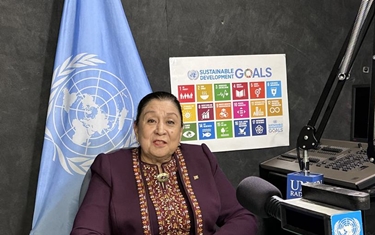“The conventional wisdom about the superiority of men in leadership is the result of long-term cultural and social attitudes … Modern reality excludes any predisposition of gender to leadership” — Aksoltan Atayeva , Ambassador Extraordinary and Plenipotentiary of Turkmenistan to the UN
Since 1995, the number of women permanent representatives to the UN has grown from 7 to 38. “Slow, but progress is still there,” says Ambassador Extraordinary and Plenipotentiary Aksoltan Atayeva, who has represented Turkmenistan at the UN for 28 years and is the dean of the diplomatic corps in New York. The UN News Service interviewed Aksoltan Toreevna on the eve of the International Day of Women in Diplomacy.
UN News Service: You have been leading the mission of Turkmenistan to the UN for many years. Have there been more women among ambassadors and diplomats during this time?
Aksoltan Atayeva: During my work at the UN, the situation regarding women in diplomacy is gradually changing. We are seeing an increase in the number of women serving as ambassadors and diplomats. If in 1995 there were only seven of us, now there are already 38. Little progress in 28 years, but still we do not stand still. The international community, governments of countries recognize the importance of women’s participation in decision-making, in particular by promoting the Women, Peace and Security agenda, and support gender equality. Personally, I feel this change and am happy to see the rise of women influencing international politics.
Of course, the position of UN Secretary General Antonio Guterres on achieving gender equality has a great influence on the process of women’s representation in diplomacy.
It is especially pleasing that some countries of the Muslim world, including those from Central Asia, have become more represented by women.
UNNS: What challenges have you faced in your long career as one of the few women in this mostly male club?
AA: Being one of the few women in the diplomatic community is challenging. It is necessary to overcome the notion that women are pushing this or that agenda because they are women. In fact, this is not so. It is necessary to prove that women have good training, education, experience and work no worse than men. Women are good leaders, they are more flexible, able to convince, convey their thoughts and ideas and implement them. Prejudices and stereotypes are inherent in the male majority, and they can be overcome only by proving their competence, professionalism, through their work, their activities, their behavior and attitude towards colleagues. This is the only way to win respect and gain recognition.
UNNS: When you were appointed, how did your family react to it? Is it difficult to combine the duties of a mother, grandmother and Ambassador?
AA: My family has always supported me in my professional aspirations throughout my career, including the appointment of the Permanent Representative of Turkmenistan to the UN. They understand that my work is important and requires full commitment and attention. Of course, combining the duties of a mother, grandmother and Ambassador is not always easy, but I try to find a balance between family and work. Here it is important to be confident in the support of loved ones and be ready for compromises in order to successfully cope with their professional and family responsibilities.
UNNS: A recent UNDP survey showed that the majority of men and women in the world believe that men have the ability to lead a country, a business, an organization to a greater extent than women. In your opinion, can such a conventional wisdom change in the near future, and what needs to be done to achieve this?
AA: The conventional wisdom about the superiority of men in leadership is the result of long-term cultural and social attitudes that correlate with the role of women in society. However, modern reality excludes any predisposition of sex to leadership. Women excel in many areas and successfully occupy high positions in politics, business and various organizations. To change such beliefs, it is necessary to continue education, enlightenment, support women’s leadership and guide the next generation of girls to achieve goals without gender restrictions.
UNNS: At the same time, statistics consistently prove that women are excellent negotiators and have the ability to diplomatically resolve many issues. Do you agree with this based on your practice?
AA: I absolutely agree. Women have a special talent for negotiation and diplomacy. Thanks to our empathy, patience and ability to find compromises, we are able to effectively resolve disputes and make constructive decisions. I have witnessed this more than once in my practice and am convinced that women play an important role in achieving peace and stability in international relations. However, this is confirmed in the UN General Assembly resolution 76/269 of June 20, 2022, which proclaimed the International Day of Women in Diplomacy.
UNNS: What would you like to say to girls who choose a career in diplomacy?
AA: Addressing young diplomats, I would first of all like to emphasize that an international career is, first of all, an exciting and very responsible way of serving one’s country. However, it should be remembered that diplomacy requires a lot from a person: education, outlook, high intelligence, hard work, flexibility, the ability to work in multinational teams and solve complex problems, as well as good health.
Dear girls, be ready for challenges, but don’t let them stop you. Use your talents and strive to achieve your goals. The world needs your abilities, and I am sure that you will be able to make a significant contribution to achieving peace and trust between peoples, the sustainable development of your country, region and the world as a whole. Dare! /// UN News cross-post, 24 June 2023, originally posted here: https://news.un.org/en/interview/2023/06/1442242
— This translation copyright to nCa
#Aksoltan_Atayeva, #Turkmenistan, #UN, #interview, #women, #International_Day_of_Women_in Diplomacy,
